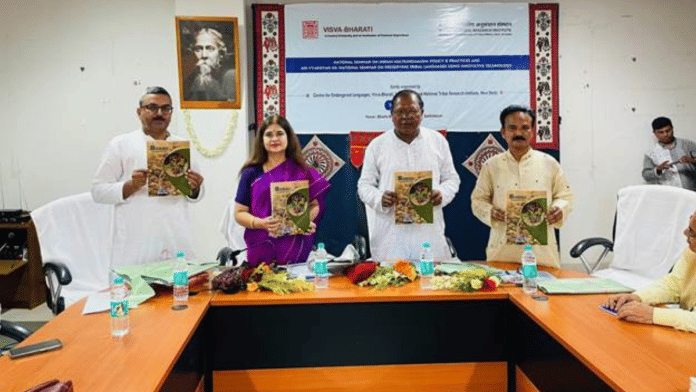New Delhi: The preservation of tribal languages is one of the most pressing issues facing multilingualism in India today, said Prof. Binoy Kumar Saren, Vice Chancellor, Visva-Bharati at a joint academic gathering Saturday, a PIB release stated.
Aadi Vyakhyan 06: National Seminar on Preserving Tribal Languages Utilising Technology & Indian Multilingualism: Policy & Practices was recently held in Visva-Bharati University at Bhasha Bhavana to emphasise on the urgent need for academic attention to preserving tribal languages.
The program was formally opened by the Hon’ble Vice Chancellor (Officiating) of Visva-Bharati, Prof. Binoy Kumar Saren. Prof Saren in his Inaugural address spoke on the need to preserve tribal languages, noting that “When a tribal language dies, valuable oral history, customs, and indigenous wisdom–often about the environment and sustainable living–are lost. Language preservation also empowers tribal communities and encourages identity, pride, and continuity across generations focusing on retaining multilingualism in the country”.
Prof. Nupur Tiwary, Special Director, NTRI, emphasized the need for innovative initiatives to promote the preservation of tribal languages. She highlighted the concerted efforts being undertaken by the National Tribal Research Institute under the guidance of the Ministry of Tribal Affairs, Govt of India, through the Series of Aadi Vyakhyan program.
During the seminar, two books on endangered tribal languages published by the CFEL, Visva-Bharati, were released by the dignitaries. The inaugural session also witnessed the Udbodhini Sangit played by Students of Sangit Bhavana Visva Bharati, the release added.
The play, titled “The Blind Opera,” directed by Shri Mrityunjay Prabhakar, emerged as a platform to signify and celebrate the multilingual diversity of India. The valedictory session of the seminar felicitated tribal resource persons Pravat Koraz for Kurukh and Santosh Tudu for Mahali language for their contribution in building a dictionary translating tribal languages into English, Hindi, and Bengali.






